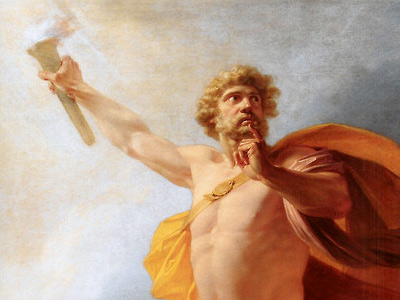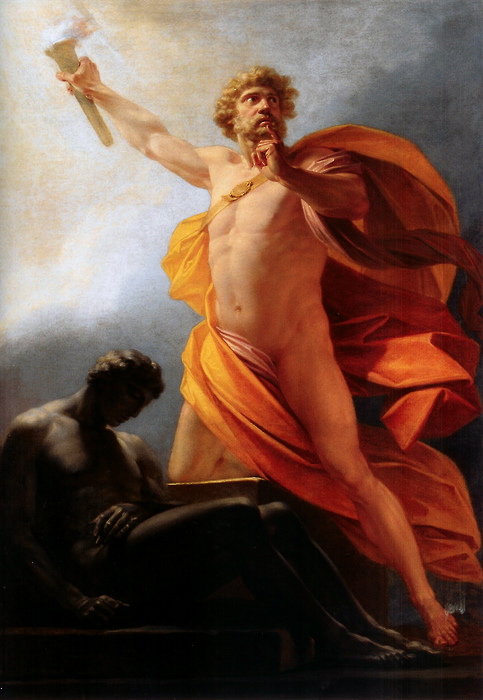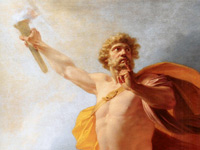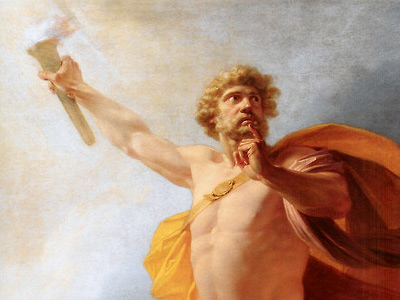Prometheus

Prometheus (/prəˈmiːθiəs/ prə-MEE-thee-əs; Greek: Προμηθεύς [promɛːtʰeús], meaning "forethought") is a Titan in Greek mythology, best known as the deity in Greek mythology who was the creator of mankind and its greatest benefactor, who stole fire from Mount Olympus and gave it to mankind.

Ancient myths and legends relate at least four versions of the narratives describing Prometheus, his exploits with Zeus and his eternal punishment as also inflicted by Zeus. There is a single somewhat comprehensive version of the birth of Prometheus and several variant versions of his subjection to eternal suffering at the will of Zeus.
The most significant narratives of his origin appear in the Theogony of Hesiod which relates Prometheus as being the son of the Titan Iapetus by Clymene, one of the Oceanids. Hesiod then presents Prometheus as subsequently being a lowly challenger to Zeus's omnipotence. In the trick at Mecone, Prometheus tricks Zeus into eternally claiming the inedible parts of cows and bulls for the sacrificial ceremonies of the gods, while conceding the nourishing parts to humans for the eternal benefit of mankind. The two remaining central episodes regarding Prometheus as written by Hesiod include his theft of fire from Olympus for the benefit of mankind against the will of Zeus and the eternal punishment which Prometheus would endure for these acts as inflicted upon him by the judgment of Zeus.
For the greater part, the pre-Athenian ancient sources are selective in which of these narrative elements they chose by their own preferences to honor and support and which ones they chose to exclude. The specific combinations of these relatively independent narrative elements by individual ancient authors (Hesiod, Homer, Pindar, Pythagoras), and specific exclusions among them, are often influenced by the particular needs and purposes of the larger myths and legends which they are depicting. Each individual ancient author selectively preferred certain crucial stories depicting Prometheus over others.
The intensive growth and expansion of Greek literature and philosophy in the classical fourth and fifth century Athenian period would greatly affect both the interpretation and influence which the myth of Prometheus would exert upon Athenian culture. This influence would extend beyond its dramatic and tragic form in the Athenian period and influence large portions of the greater Western literary tradition which would follow it for over two millennia. All three of the major Athenian tragedians, Aeschylus, Sophocles and Euripides, were affected by the myth of Prometheus. The surviving plays and fragments of Aeschylus regarding Prometheus retain a special place of prominence within modern scholarship for their having survived the ravages of time. The majority of plays written by Aeschylus, Sophocles and Euripides have been lost to literary antiquity, including many of their writings on Prometheus.
Both during and after the Renaissance, Prometheus would again emerge as a major inspiration for his literary and poetic significance as a symbol and archetype to inspire new generations of artists, sculptors, poets, musicians, novelists, playwrights, inventors, technologists, engineers and film-makers. His literary and mythological personage remains prominently portrayed in contemporary sculpture, art and literary expression including Mary Shelley's portrayal of Frankenstein as The Modern Prometheus. The influence of the myth of Prometheus extends well into the 20th and 21st century. The artificial chemical element Promethium is named from it.
LEGENDS

RESOURCES
This article uses material from the Wikipedia article "Prometheus", which is released under the Creative Commons Attribution-Share-Alike License 3.0.
© Stories Preschool. All Rights Reserved.









